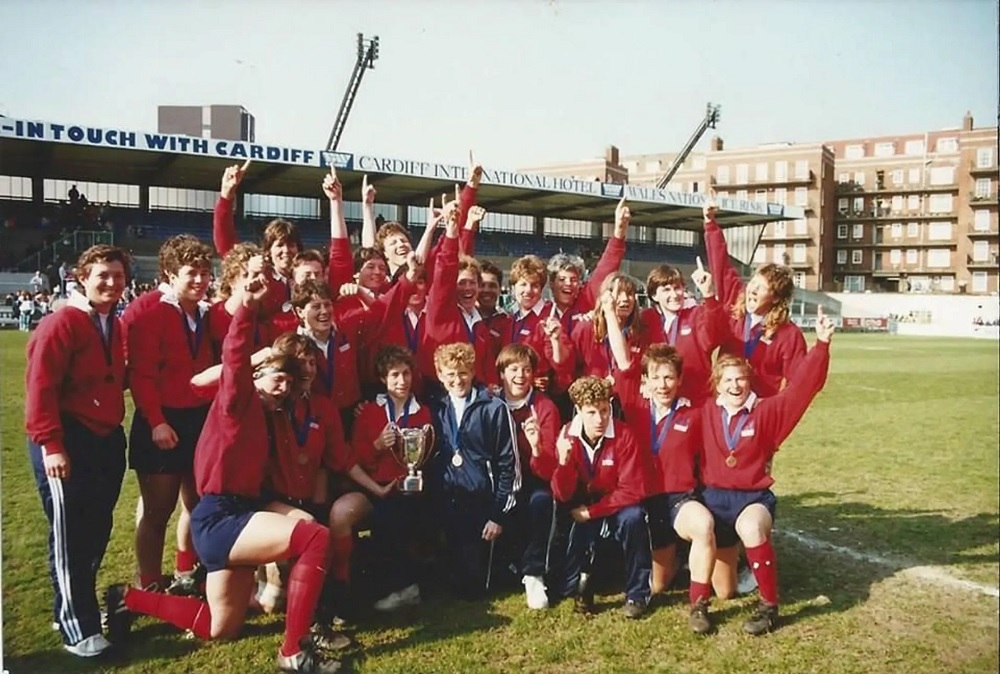‘Naivete of youth’ made first unofficial women’s Rugby World Cup in Wales possible says organiser

The first women’s Rugby World Cup which took place in Wales in 1991 would not have happened without a healthy mix of agitation and inexperience, one of its organisers has said.
Deborah Griffin was fundamental in organising that inaugural tournament which was contested over a two-week period around Cardiff in April 1991.
Despite never being approved by the International Rugby Board, the final was played at Cardiff Arms Park before almost 3,000 fans, where tournament champions the United States defeated England 19–6.
The tournament has grown since then – on Saturday, England take on New Zealand in the World Cup final at Eden Park in Auckland in front of 40,000 ticket-holders.
But this week, Griffin and fellow organisers and pioneers Sue Dorrington, Mary Forsyth and Alice Cooper were inducted into the World Rugby Hall of Fame for their seminal contribution to the women’s game.
“It was naivete of youth,” Griffin, who was press officer at the England Women’s Rugby Football Union at the time,.
“We really didn’t know what we couldn’t do and we really didn’t know what we shouldn’t be doing. You can’t say, ‘well, we’ve tried that and it won’t work’. We just thought it was a great idea, so we were going to make sure it happened.”
By January of 1991, the naivete had begun to wear off, replaced by cold reality for Griffin and her team, all players at Richmond in London. They could not find a sponsor and the International Rugby Board (IRB) refused to sanction the tournament.
“Great credit to all the countries,” Griffin said. “We wrote to them to say we’ve not been able to get any sponsorship and you’re going to have to pay for your accommodation. We were looking at cancelling it.
“They all wrote back and said, ‘no, we’re still coming’ and damn,” she said, laughing at the memory, “we didn’t think that at all.”
‘Disruptors’
Logistical headaches compounded the financial ones. In the age before email, Griffin’s fax machine became a fast companion. Printing programmes and team sheets, handling requests from a sometimes sceptical media, and a Russian team who arrived with vodka and caviar but no funds were amongst the myriad challenges.
Then, three days before the final, the hotel England were staying in realised they had made a double-booking. The team, after much persuasion, slept on sleeping bags on the conference room floor.
Dorrington played hooker for England in the title clash, which they lost 19-6 to the Americans. In 1994 they got their own back, beating USA 38–23 to lift the trophy in Scotland.
The women’s hard-fought battle for legitimacy and dogged persistence had made inroads by 1998, when World Rugby predecessor the IRB officially sanctioned the tournament.
The cup itself, however, was lost for 15 years before it was finally discovered in a former administrator’s attic. This year, the winners of those two “unofficial” tournaments were engraved on the current trophy.
Griffin, Dorrington, Forsyth and Cooper had one descriptor frequently and lovingly levelled at them during the Hall of Fame induction: agitators.
“What is really amazing is the number of people who played in that first World Cup who went on to be administrators in their unions and push things forward,” Griffin said. “I still keep hearing about people, and that’s fantastic.
“I don’t think we know right now. They probably don’t know themselves. At the moment they’re playing, they have to focus on being role models for a whole generation.
“But I have no doubt that amongst the people playing in this tournament there are quite a number of future disruptors.”
Support our Nation today
For the price of a cup of coffee a month you can help us create an independent, not-for-profit, national news service for the people of Wales, by the people of Wales.





